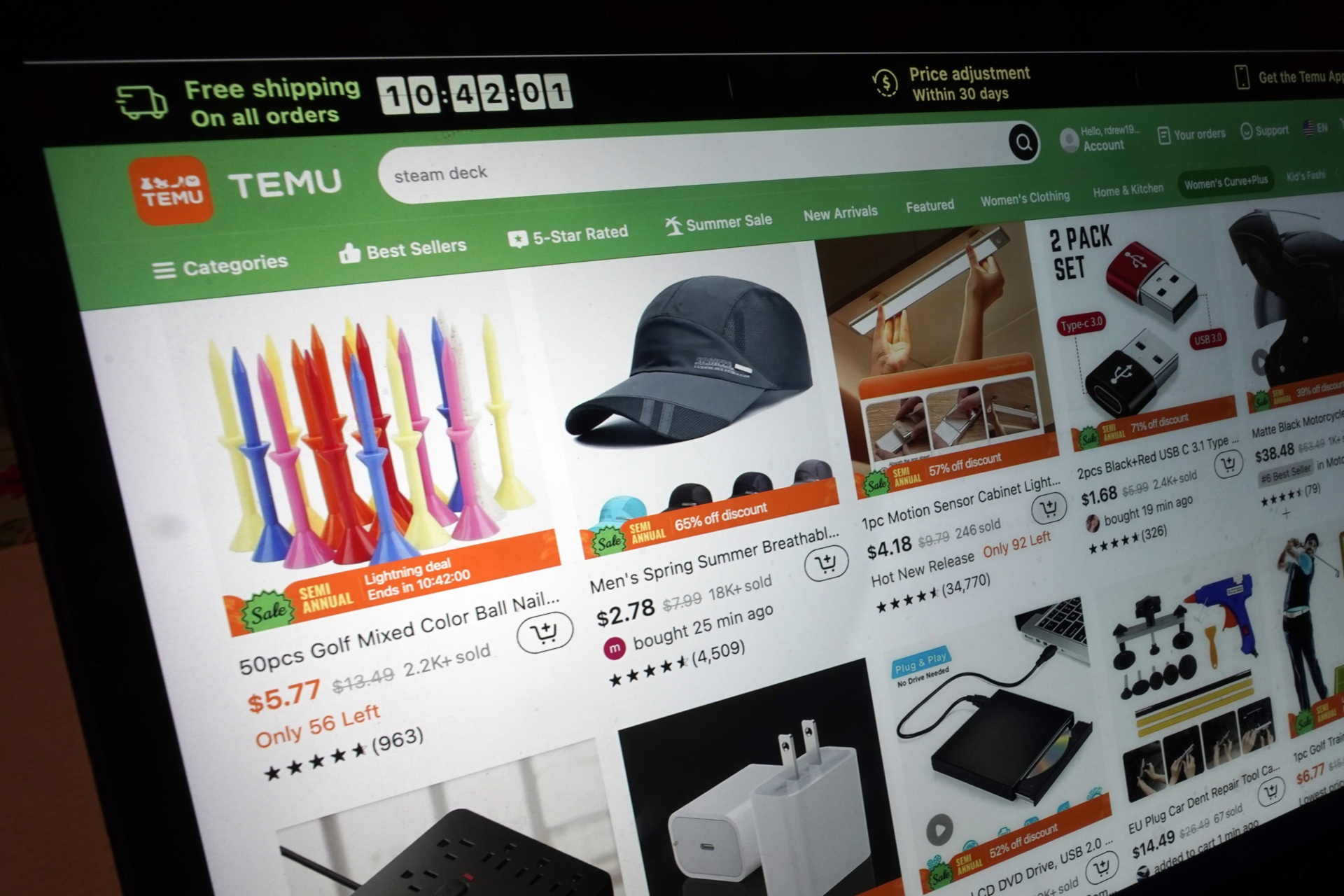We support our Publishers and Content Creators. You can view this story on their website by CLICKING HERE.
Amazon is planning to launch a steep discount website featuring direct shipments from dubious Chinese suppliers, multiple outlets reported in late June.
One report from the website The Information suggested that Amazon expects to take advantage of a trade loophole currently exploited by Chinese sites Temu and Shein to avoid paying taxes – and potentially import slavery-tainted products.
WATCH — CBP: China Tries to Keep Businesses from Knowing Products Are Made with Slave Labor and “Solar Panels Are a Big Issue”:
The Information initially broke the story last week that Amazon is planning to create a service offering American buyers the option of purchasing extremely inexpensive products directly from China. The website will likely function similarly to Temu and Shein, which currently operate in America as mobile phone applications in which Americans can rapidly purchase thousands of products at well below market value in the U.S. Shein specializes in “fast fashion” clothing for young women, with garments as cheap as one dollar; Temu sells clothing as well as household goods, art supplies, and other varied items.
According to CNBC, Amazon held an event in late June for Chinese sellers in which it announced the plan and suggested the sellers will find higher profit margins working with Amazon than with the Chinese sites.
“Amazon will ship the products directly from China to the U.S., with the goal of delivering them to shoppers within nine to 11 days, the presentation shows,” CNBC reported. “In the past, Amazon sellers in China have relied on the company’s fulfillment services, called Fulfillment by Amazon, to send goods to warehouses in the U.S. before they are dispatched to customers.”
A growing number of products available on Amazon are from Chinese companies with brand names unknown in America. According to CNBC, “the number of items sold by Chinese sellers on its site grew more than 20% year over year [in 2023], while the number of Chinese merchants with sales upward of $10 million increased 30%.” Walmart and other major online retailers in America have seen similar spikes in the number of Chinese-origin products on their site, but still ship the products to the U.S. first before the reach the consumer.
A major reason that Temu and Shein can offer products at steep discounts, according to significant evidence cited by Congress and human rights activists, is that they rely on Chinese suppliers with ties to slavery to ship directly to American customers, using a loophole that exempts them from import taxes. U.S. import law includes a provision identifying packages worth less than $800 as de minimis. De minimis shipments do not have to pay duties or import taxes and are not subject to the same human rights scrutiny as larger packages.
The loophole has made policing products from Temu and Shein – often worth as little as $10 each – nearly impossible. The Uyghur Forced Labor Prevention Act (UFLPA), a 2022 law, established a presumption that all packages shipped from occupied East Turkistan (China’s “Xinjiang Uyghur Autonomous Region,” or “XUAR”) are tainted by slavery unless the importer can prove the supply chain is clean. It does not apply to de minimis packages, so most purchases from Temu and Shein escape UFPLA scrutiny.
Communist China has created a sprawling slavery infrastructure through the ongoing genocide of the Uyghur people of occupied East Turkistan, initially imprisoning millions of people in concentration camps, then having them “graduate” from the camps to be enslaved in factories. Chinese websites sell Uyghurs in “batches” of 50 to 100 people and the government incentivizes its factories to use Uyghur slaves. Many of these slaves are sold to factories outside of East Turkistan, so the UFLPA would also fail to protect American consumers from these shipments.
Amazon is now poised to exploit the de minimis loophole, the Information reported. The outlet cited an anonymous source at Amazon who claimed that the company is expecting to ship small packages directly from China in a way that exempts them from import duties. Amazon has not confirmed its plans regarding the exemption when asked at press time.
The pervasiveness of Uyghur and other slaves in the Chinese economy makes it impossible for American companies to properly vet suppliers, experts told Congress in May.
“Beijing currently operates the world’s largest system of state-imposed forced labor, with over two million targeted Uyghurs and other ethnic group members at risk,” Adrian Zenz, a senior fellow with the Victims of Communism Memorial Foundation, told Congress. “Unlike most forms of forced labor, state-imposed forced labor operates through a pervasively coercive social context marked by a lack of civic freedoms and a state that generates powerful coercive pressures through local mobilization via an extensive grassroots bureaucracy.”
“As a result, due diligence efforts based on social or labor audits are not feasible, both in Xinjiang and in other Chinese provinces that receive transferred ethnic workers from that region,” Zenz concluded. “The only ethical response is divestment.”

Uyghur Turks who say they haven’t heard any news our families and relatives in Eastern Turkistan attend a protest near the Chinese embassy, in Ankara, Turkey, on May 24, 2022. (Burhan Ozbilici/AP)
Congressional investigations have named Shein and Temu directly as implicated in the Uyghur slave trade. A report published in June 2023 by the House Select Committee on the Chinese Communist Party warned Americans there was an “extremely high risk” that Temu and Shein products came from slavery-tainted supply chains. An attempt by Shein to obtain an initial public offering (IPO) in the U.S. stock market fizzled out after loud Congressional opposition, while Temu is facing legal action for allegedly stealing customers’ information.
Arkansas Attorney General Tim Griffin sued Temu last week on the grounds that the application is “functionally malware.”
“Temu is not an online marketplace like Amazon or Walmart. It is a data-theft business that sells goods online as a means to an end,” Griffin said in a statement, noting that Temu is “led by a cadre of former Chinese Communist Party officials, which raises significant security risks to our country and our citizens.”
While Shein and Temu may enjoy a home court advantage in China, Amazon can offer Chinese suppliers a safer venue to sell their wares as the two companies’ business practices have inspired a backlash and legal action in America.
The Hong Kong-based South China Morning Post reported on Sunday that the reception to the Amazon plan in China appears “quite positive,” citing local vendor representatives. One supplier told the outlet that working with Amazon – rather than Chinese companies already facing legal action in America – is a good way to “expand our sales channel and lower the risks.”
It is unclear how long Amazon will be able to, if it chooses, exploit the de minimis loophole. Sens. Marco Rubio (R-FL) and Sherrod Brown (D-OH) introduced legislation in June 2023 to close the loophole, the Import Security and Fairness Act.
“Every day we wait, millions more packages from Communist China flood into our country, endangering American customers and undermining American businesses,” Sen. Rubio told Breitbart News, urging the Senate to move on the bill.

 Conservative
Conservative  Search
Search Trending
Trending Current News
Current News 









